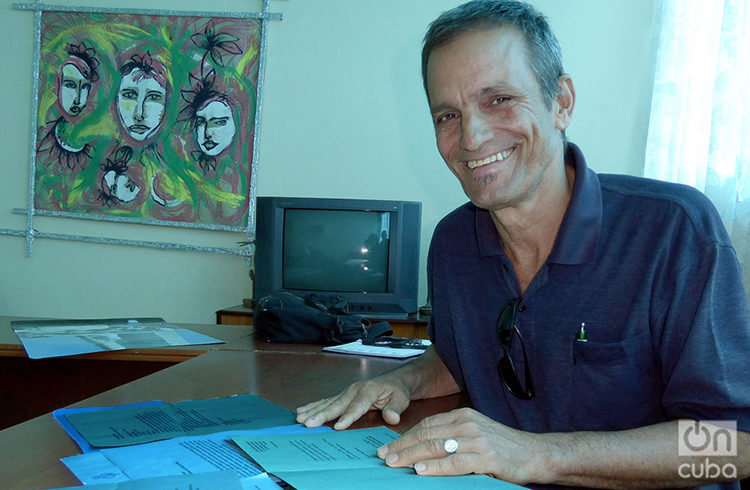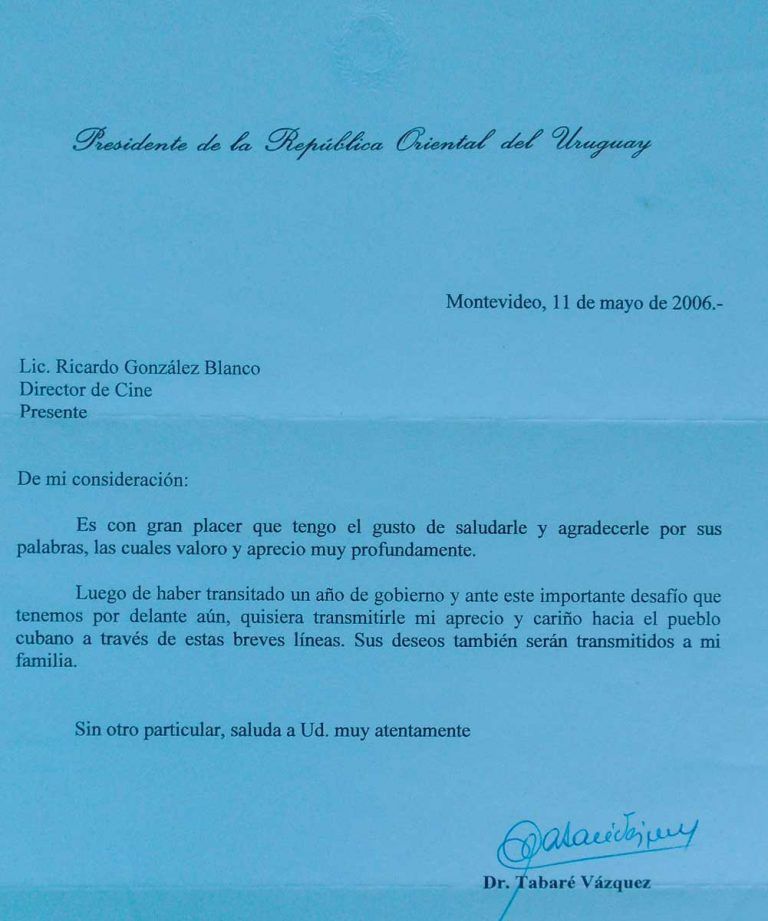“Montevideo, May 11, 2006. It is with great pleasure that I greet you and thank you for your words, which I very deeply value and appreciate….” Thus, with the cordiality of friends, Dr. Tabaré Vázquez, President of Uruguay, responded in his letter to a particular addressee: Ricardo González Blanco, a 53-year-old Cuban, from the Pinar del Río municipality of Sandino.
A history graduate from the Rafael María de Mendive Higher Pedagogic Institute of Pinar del Río, Ricardo has gone through several jobs. In his life, he has been a secondary school teacher, his town’s filmmaker, methodologist in the house of culture, and even journalist at a local radio station.
But in Sandino, above all those things, he is known as the man who corresponds with kings and heads of state.
In a plastic file he takes care of as if it were a treasure, Ricardo collects the letters, coming from such distinguished places like the Palace of the Zarzuela of Madrid, the principality of Asturias, the Palace of Quemado of La Paz or that of Miraflores in Caracas.
All of them are addressed to him, with a message of greeting and best wishes, in the name of figures who in their time marked guidelines in the history of the continent, like deceased Venezuelan President Hugo Chávez, and others who are still in power, like Bolivian President Evo Morales.
“I still don’t know why I do this,” Ricardo confesses, after having initiated 10 years ago this unusual hobby. But he specified that he has never used the correspondence to ask for material things.
“For me, writing a letter to a head of state is like conceiving a work of art. I write them slowly, seeking information here and there.
“Sometimes I wake up at three in the morning and change a word for another, so that that letter, when it arrives, carries a correct message.”
He says that the length of the texts oscillates between one and three pages, in which he has never interfered in a nation’s domestic affairs.
“I always refer to issues that have to do with peace, the environment, culture and the national heroes of independence. Since I am a history professor and am always studying, writing is not difficult for me.”
On the other hand, writing the documents so that they be at the height of those to whom they are addressed, in palaces and government houses from other parts of the world, is usually complicated.
“Just imagine, I don’t know how to talk on a cell phone and much less use a computer. That’s why when I finish writing I have to go to an enterprise, watch out that the boss is not there and ask an acquaintance to do me the favor of typing it and printing it out,” confesses Ricardo, who had to stop working several years ago to care for his mother.
“Sometimes, with the same letter I have to repeat the process more than once because a word doesn’t come out right,” he adds.
He affirms that he doesn’t correspond with “everybody,” just with those personalities who for some reason catch his attention. “If it’s a bad president, who makes decisions against the people, I don’t write to him or her,” he affirms, although on the list of those who have answered there are figures of different political tendencies, like Ecuadorian Rafael Correa, Chilean Michelle Bachelet or the King of Spain.
After more than a decade, he considers what he does as a way of establishing a friendship with other peoples. But until now there hasn’t been an official institution interested in his “private” diplomacy.
Only in the Sandino radio station, after finding out about his story, recently he has been interviewed when he has received new answers to his letters.
This has turned him into a popular character, whom the people resort to when they need help to write on paper applications and concerns, probably with the belief that if the governments of other countries have answered, the institutions from here will also do so.
However, Ricardo recognizes that luck is not always on his side. He did not have acknowledgments of receipt from Néstor Kirchner or Cristina Fernández (Argentina), or Martín Torrijos (Panama), or Pope Benedict XVI, or Kofi Annan when he was UN Secretary General.
Even so, he affirms he has never thought of giving up. “In fact, right now I have a list for Lenin Moreno, the new Ecuadorian president, and another for the mothers of the Plaza de Mayo.”
Like the others, they are the result of inspiration and the favors of several friends who help him to get paper, type the texts and print them. However, he feels that the effort is compensated for when the mailman knocks on his door with messages like this one, signed in his own hand by Tabaré Vázquez: “After a year in government and still faced by this important challenge, I would like to pass on my appreciation and affection to the Cuban people through these brief lines.”
“There are people who do not value these things,” Ricardo recognizes, “but for me, they have a very great significance.”












great friend whith a big heart greetings neighbor